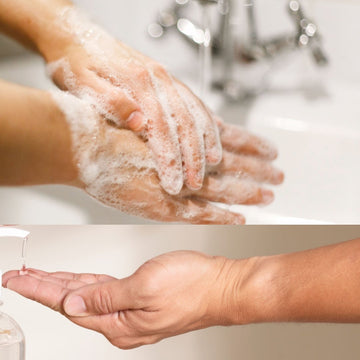By Dr. Nirvana S. Pillay, Medical Scientist and Founder of Nirvana Natural Bliss
Hand hygiene is an essential practice to keep ourselves and others healthy, especially during a pandemic. One of the primary ways we can prevent the spread of infectious diseases is by washing our hands with soap and water or using hand sanitiser. However, there is some debate about which is better, hand soap or hand sanitiser. In this blog, we will explore the benefits and drawbacks of both options to help you make an informed decision.
Hand Soap: Pros and Cons
Hand soap is a traditional and reliable way to clean your hands. It works by breaking down the dirt and grime on your hands, allowing water to wash them away. Here are some pros and cons of using hand soap:
Pros:
Effectiveness: Hand soap is very effective at removing dirt and germs from your hands. When used correctly, it can eliminate up to 99.9% of bacteria and viruses on your skin.
Easy to Use: Hand soap is easy to use, and you don't need any special equipment. All you need is a sink with running water and a bar or liquid soap.
Moisturising: Many hand soaps are formulated with moisturizing ingredients that can help keep your skin soft and smooth.
Cons:
Availability: Hand soap may not always be available, especially in public places. Some people also find it challenging to carry soap with them when they are on the go.
Time-consuming: Washing your hands with soap and water takes time, and you need to do it for at least 20 seconds to be effective. This can be a problem if you are in a rush or have limited access to a sink.
Messy: Using hand soap can be messy, especially if you are using a bar soap. It can leave a residue on your hands, which can be inconvenient if you need to handle something immediately after washing your hands.
Hand Sanitiser: Pros and Cons
Hand sanitiser is a convenient and portable alternative to hand soap. It contains alcohol or other disinfectants that kill germs on your hands. Here are some pros and cons of using hand sanitiser:
Pros:
Convenient: Hand sanitiser is easy to carry with you, and you can use it anywhere, anytime. It is particularly useful when you don't have access to soap and water, like when you are traveling or in public places.
Quick: Hand sanitiser works quickly, and you don't need to spend a lot of time washing your hands. It can kill germs in as little as 15 seconds.
Effective: Hand sanitiser can be very effective at killing germs and bacteria on your hands. It is particularly useful when you are in a high-risk environment, like a hospital or school.
Cons:
Not as Effective as Soap: While hand sanitiser can kill germs, it is not as effective as soap and water at removing dirt and grime from your hands. If your hands are visibly dirty, hand sanitiser may not be enough to clean them properly.
Drying: Hand sanitiser can be drying to your skin, especially if you use it frequently. This can cause your skin to become cracked, dry, and itchy.
Potentially Harmful: Some hand sanitiser contains harmful chemicals that can be toxic if ingested or absorbed through your skin. You should be careful when using hand sanitiser, particularly around children.
Which is Better?
The question of which is better, hand soap or hand sanitiser, depends on the situation. If you have access to soap and water, it is generally better to wash your hands with soap and water. Soap and water are more effective at removing dirt and grime from your hands, which can reduce the number of germs on your skin. Soap and water are also better at removing certain types of germs, such as norovirus and clostridium difficile.
However, if you don't have access to soap and water, or if you need to clean your hands quickly, hand sanitiser can be a good option. It is particularly useful in situations where you need to disinfect your hands frequently, like in a hospital or school.
It is also worth noting that not all hand soaps and hand sanitisers are created equal. Look for products that are alcohol-based and contain at least 60% alcohol for hand sanitiser, and avoid products that contain harmful chemicals like triclosan in hand soap. If you have sensitive skin, look for products that are formulated for sensitive skin or that contain moisturising ingredients.
Ultimately, the best way to prevent the spread of infectious diseases is to practice good hand hygiene. Whether you choose to use hand soap or hand sanitiser, make sure you wash or disinfect your hands regularly, especially after touching high-risk surfaces like door handles or using the bathroom. And remember, hand hygiene is just one part of a comprehensive approach to preventing the spread of infectious diseases.





